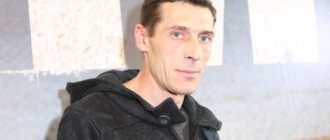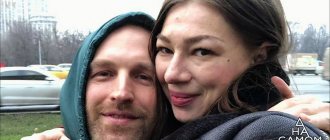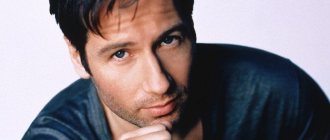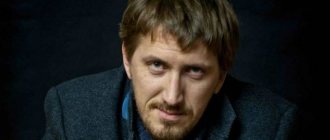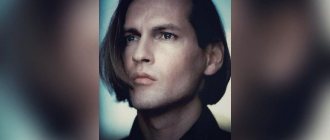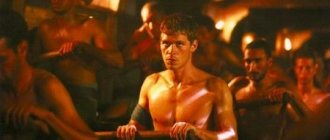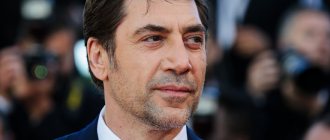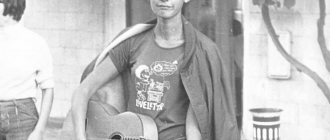Biography
Timofey Spivak was born on November 13, 1947 in Kherson.
Studied at a music school. He entered the airborne military school, but dropped out of school after completing military service in the army. He entered the Krasnoyarsk Music College to study violin, but after receiving a hand injury, he transferred to the operetta department. He played at the Krasnoyarsk Musical Comedy Theater and at the Maikop Drama Theater.
In 1972, Timofey Ivanovich entered GITIS on the course of Vladimir Andreev. In the years he played at the Moscow Drama Theater. K.S. Stanislavsky.
Together with the Mexican director Sergio Olkhovich (who starred in the film “Esperanza”) he created the Russian-Mexican Institute of Art, Film and Theater in Mexico City, Mexico.
Family
Wife (d. 1988) - actress Ekaterina Vasilyeva, daughter - actress Maryana Spivak.
FACTS ABOUT ZHANNA PROKHORENKO
“Out of friendship, I starred with an old friend in the TV series “Twins.” My daughter Katya played the daughter, and Maryasha’s granddaughter played the granddaughter.” Zhanna Prokhorenko
- Zhanna Prokhorenko was born in May 1940 in Poltava;
- From his marriage to director Evgeny Vasiliev, he left behind a daughter, Ekaterina, who also became an actress;
- Ekaterina Vasilyeva’s marriage to actor Timofey Spivak gave birth to a daughter, Maryana, now an actress at the Satyricon Theater;
- Zhanna Prokhorenko's common-law husband was film screenwriter Arthur Makarov;
- People's Artist of Russia Zhanna Prokhorenko died on August 1, 2011.
Creation
Movie actor
- 1974 - The Secret of the Partisan Dugout - commander of the partisan detachment
- 1975 - Gasparone - student Erminio
- 1976 - My love in the third year - commissar of the student construction team
- 1977 - Dust in the Sun - Joseph Vareikis
- 1980 - Serving the Fatherland - Lieutenant Alexey Nalymov
(
prize for best actor at the XIV All-Union Film Festival, 1981
) - 1980 - White Snow of Russia - Max Euwe
- 1980 - Star Inspector - Karel Zdenek
- 1981 - Sixth - Alexander
- 1982 - Battle at the crossroads - Travnikov’s adjutant
- 1983 - It was the fourth year of the war - Arthur
- 1983 - Battalion Combatants - Likhachev
- 1982 - 1984 - Fire Roads - Richardson
- 1984 - Cancan in an English park - Maxim Rutkovsky
- 1985 - Maritza - Tasillo
- 1985 - Farewell of a Slav - Alexey
- 1986 - The victims have no claims
- 1986 - Scarlet Stone - Yuri Dolgov, Stepan’s friend
- 1987 - State border. Film 6: Beyond the Threshold of Victory - Klim Rogozny
- 1988 - Esperanza (Mexico - USSR) - Anatol Olkhovsky
- 1993 - Against all odds
Theater actor
- “Threshold” by A. Dudarev - dragoon
- "Cyrano de Bergerac" by E. Rostand - Christian de Nevilette
- “Farewell in June” by A. Vampilov - Gomyr
Film director
- 1992 - Three days out of law
- 1993 - Against all odds
- 2001 - Woe-misfortune
Movie screenwriter
- 1993 - Against all odds
- 2001 - Woe-misfortune
Voice acting
- 1958 - Light in the Forest
- 1968 - Hellfighters - Jack Lomax
- 1972 - Mike O'Hara IV - Rodriguez
- 1972 - The modest charm of the bourgeoisie - Minister
- 1974 - Conversation - Stan
- 1976 - Easter holidays - Jay. Osborne
- 1978 - Convoy - Chuck Arnoldi
- 1978 - Escape - Marty Galod
- 1978 - Abigail - Vitai
- 1979 - Justice for All - Frank Bowers
- 1979 - Stingy - Valere
- 1979 - Runaways from Hell - Carmelo Sierra
- 1980 - Provincial
- 1981 - Banovich Strakhinya - Aliya
- 1981 - Professional - Minister
- 1981 - Little Fox Vuk - narrator
- 1982 - Condor
- 1982 - Grog - Commissioner
- 1982 - Doctor Faustus - Adrian Leverkoen
- 1982 - Gandhi
- 1982 - The Head of Tereon - Marek
- 1982 - Samrat - Director
- 1983 - Invincible
- 1983 - The Power of Love - Yeshwant
- 1983 - I wish it was Sunday!
- 1983 - Arabella - the pirate's daughter - Taaniel Tina
- 1983 - Ball of Fairy Tales
- 1983 - Short sleeves - Yusup
- 1983 - The day is longer than the night - Spiridon
- 1984 - Investigator - Commissioner Lucien
- 1984 - In Someone Else's Blood
- 1984 - Like the Three Musketeers - Lakhan Singh / Thakur Singh
- 1984 - Bank left, bank right - Paul Senke
- 1984 - Victim of Deception - Dr. D'Silva
- 1985 - Communication through a pizzeria
- 1985 - Melting Clouds - Sura Arora / Prakash Arora
- 1985 - My central village
- 1985 - Atkins
- 1985 - Little Thumb
- 1985 - Vera - Inspector Berua
- 1986 - Networks of Love
- 1986 - Invulnerable - Harry Murphy
- 1986 - Crocodile Dundee - Michael "Crocodile" Dundee
- 1986 - Melodrama - Marcel Blanc
- 1986 - Complaint - Marchuk
- 1986 - Bedroom Window - Colleen Ventvos
- 1986 - Gold Diggers
- 1986 - Order No. 027
- 1987 - Dance, dance
- 1987 - Cycle
- 1987 - Mister India
- 1987 - The Adventures of a Babysitter - Bleak
- 1987 - Death of the beautiful roe deer
- 1987-1990— Beauty and the Beast — Elliot Birch
- 1987 - Mio, my Mio - King
- 1987 - Three Men and a Baby - Peter Mitchell
- 1988 - Crocodile Dundee 2 - Michael "Crocodile" Dundee
- 1988 - Hanussen - Erik Jan Hanussen
- 1988 - Married to the Mafia - Frank "Cucumber" De Marco
- 1988 - To the left of the elevator - Boris
- 1988 - The Other Woman
- 1988 - Hero
- 1988 - Good Mother - Brian
- 1988 - Mississippi on Fire - Mayor Tillman
- 1988 - Hoof here, hoof there
- 1988 - Kites do not share their prey
- 1988 - Maria and the sea
- 1989 - Guru - Rufes
- 1989 - The Crime of Antoine
- 1989 - Three Angry Men
- 1989 - Open up, police! 2
- 1989 - Code of Silence - Malik Rakhimov
- 1989 - Ram and Lakhan - Kesharia Villati
- 1990 - Mister Destiny - Niles Pender
- 1990 - Enemy - D'Costa
- 1991 - In Russian style
- 1991 - Spider - artist
- 1992 - Blame the Bellboy - Mike Lawton/Charlton Back
- 1992 - Single White Female - Mitchell Myerson
- 1992 - Three days outside the law - paratrooper Andrei
- 1993-1998 - Babylon 5 - Geoffrey Sinclair, John Sheridan and others (season 1-4 on TV-6)
- 1994 - Beverly Hills Cop 3 - Steve Fullbright
- 1994-1995 - Aladdin - Arbatas
- 1995 - Sense and Sensibility - Colonel Brandon
- 2001 - Crocodile Dundee in Los Angeles - Michael "Crocodile" Dundee
- 2007 - Outlaw - Danny Bryant
- 2007 - Magicians
- 2007 - Elegy - Charlie Rose
- 2008 - State Enemy No. 1 - Jacques Mesrine
- 2008 - State Enemy No. 1: Legend - Jacques Mesrine
- 2010 - Crazy Ride - Webster
- 2011 - Unknown - Rodney Cole
- 2011 - Love: Instructions for use - Augusto
- 2011 - Sucker Punch - Sage
- 2011 - Red Lights - Howard McColm
- 2012 - Ghost Rider 2 - Roarke
- 2012 - Obsessed
- 2012 - Words - Old Man
- 2012 - The Woman in Black - Sam Daly
- 2012 - Roman Adventures - Uncle Sol
- 2012 - Moonrise Kingdom - Commander Pierce
- 2012 - The Dark Knight Rises - Prisoner
- 2012 - Bourne Evolution - Ezra Kramer
- 2012 - Move Your Fins 2 - Sammy
- 2012 - Operation Argo
- 2012 - Seven Psychopaths - Hans
- 2012 - Asterix and Obelix in Britain - Hookhand
- 2012 - Lincoln - Richard Schell
- 2012 - Jack Reacher - Zek
- 2013 - One less - Gregor
- 2013 - Dangerous illusion - Victor Aibanescu
- 2013 - Lovelace - Johnny Carson
- 2013 - When the angels sing
- 2013 - 12 Years a Slave - Parker
- 2013 - Parkland - Admiral George Berkeley
- 2013 - Shadows of unforgotten ancestors - Molfar
- 2013 - 12 Years a Slave - Parker
- 2014 - Dream League - Lord Kinnard
- 2014 - Pilgrim: Paulo Coelho
- 2014 - Judge - Sheriff Wyatt
- 2014 - Focus - Owens
- 2015 - Legend - Dr. Humphreys
- 2016 - Long live Caesar! — Arne Seslum
- 2016 - The Purge 3 - Caleb Warrens
- 2016 - The Secret Life of Pets - Tiberius the Hawk
Biography of the famous actress
Almost the entire life of a young woman unfolds before the eyes of her many fans. The biography of Emilia Spivak interests millions of viewers. But the girl doesn’t hide it. She was born in Leningrad. Emilia's dad is the well-known director Solomon Yakovlevich. An undisputed master of his craft, he is an experienced leader of a theater troupe consisting of young talents. Little Emilia was raised mainly by her mother. Natalya was a housewife and devoted all her free time to her charming daughter. Emilia was an amazingly active child. As a child, she actively took part in a colossal number of clubs. Spivak loved to play various instruments and was an excellent dancer. But nothing concrete could captivate the girl’s attention for long. I wanted to do everything at once. However, things were a little worse with studies. Emilia didn't like school. I especially avoided physics and mathematics.
Spivak first took part in a big concert performance when she was 12 years old. It was an anniversary evening dedicated to the theater where Solomon Yakovlevich worked for many years. Emilia was terribly worried. However, the resulting bright emotions more than repaid the spent nerves. After all, the audience was completely delighted with the young talent. Emilia really wanted to become an experienced lawyer. But the theatrical stage attracted her with an unknown force. As a result, Spivak entered the Academy of St. Petersburg, where he began to study dramatic art.
An excerpt characterizing Spivak, Timofey Ivanovich
The French who occupied the battery ran. Our troops, shouting “Hurray,” drove the French so far beyond the battery that it was difficult to stop them. Prisoners were taken from the battery, including a wounded French general, who was surrounded by officers. Crowds of wounded, familiar and unfamiliar to Pierre, Russians and French, with faces disfigured by suffering, walked, crawled and rushed from the battery on stretchers. Pierre entered the mound, where he spent more than an hour, and from the family circle that accepted him, he did not find anyone. There were many dead here, unknown to him. But he recognized some. The young officer sat, still curled up, at the edge of the shaft, in a pool of blood. The red-faced soldier was still twitching, but they did not remove him. Pierre ran downstairs. “No, now they will leave it, now they will be horrified by what they did!” - thought Pierre, aimlessly following the crowds of stretchers moving from the battlefield. But the sun, obscured by smoke, still stood high, and in front, and especially to the left of Semyonovsky, something was boiling in the smoke, and the roar of shots, shooting and cannonade not only did not weaken, but intensified to the point of despair, like a man who, straining himself, screams with all his might. The main action of the Battle of Borodino took place in the space of a thousand fathoms between Borodin and Bagration’s flushes. (Outside this space, on the one hand, the Russians made a demonstration by Uvarov's cavalry in mid-day; on the other hand, behind Utitsa, there was a clash between Poniatowski and Tuchkov; but these were two separate and weak actions in comparison with what happened in the middle of the battlefield. ) On the field between Borodin and the flushes, near the forest, in an area open and visible from both sides, the main action of the battle took place, in the most simple, ingenuous way. The battle began with a cannonade from both sides from several hundred guns. Then, when the smoke covered the entire field, in this smoke two divisions moved (from the French side) on the right, Dessay and Compana, on fléches, and on the left the regiments of the Viceroy to Borodino. From the Shevardinsky redoubt, on which Napoleon stood, the flashes were at a distance of a mile, and Borodino was more than two miles away in a straight line, and therefore Napoleon could not see what was happening there, especially since the smoke, merging with the fog, hid all terrain. The soldiers of Dessay's division, aimed at the flushes, were visible only until they descended under the ravine that separated them from the flushes. As soon as they descended into the ravine, the smoke of cannon and rifle shots on the flashes became so thick that it covered the entire rise of that side of the ravine. Something black flashed through the smoke - probably people, and sometimes the shine of bayonets. But whether they were moving or standing, whether they were French or Russian, could not be seen from the Shevardinsky redoubt. The sun rose brightly and slanted its rays straight into the face of Napoleon, who was looking from under his hand at the flushes. Smoke lay in front of the flushes, and sometimes it seemed that the smoke was moving, sometimes it seemed that the troops were moving. People's screams could sometimes be heard behind the shots, but it was impossible to know what they were doing there. Napoleon, standing on the mound, looked into the chimney, and through the small circle of the chimney he saw smoke and people, sometimes his own, sometimes Russians; but where what he saw was, he did not know when he looked again with his simple eye. He stepped off the mound and began to walk back and forth in front of him. From time to time he stopped, listened to the shots and peered into the battlefield. Not only from the place below where he stood, not only from the mound on which some of his generals now stood, but also from the very flashes on which were now together and alternately the Russians, the French, the dead, the wounded and the living, frightened or distraught soldiers, it was impossible to understand what was happening in this place. For several hours at this place, amid incessant shooting, rifle and cannon fire, first Russians, sometimes French, sometimes infantry, sometimes cavalry soldiers appeared; appeared, fell, shot, collided, not knowing what to do with each other, screamed and ran back. From the battlefield, his sent adjutants and orderlies of his marshals constantly jumped to Napoleon with reports on the progress of the case; but all these reports were false: both because in the heat of battle it is impossible to say what is happening at a given moment, and because many adjutants did not reach the real place of the battle, but conveyed what they heard from others; and also because while the adjutant was driving through the two or three miles that separated him from Napoleon, circumstances changed and the news he was carrying was already becoming incorrect. So an adjutant galloped up from the Viceroy with the news that Borodino had been occupied and the bridge to Kolocha was in the hands of the French. The adjutant asked Napoleon if he would order the troops to move? Napoleon ordered to line up on the other side and wait; but not only while Napoleon was giving this order, but even when the adjutant had just left Borodino, the bridge had already been recaptured and burned by the Russians, in the very battle in which Pierre took part at the very beginning of the battle. An adjutant who rode up with a flush with a pale, frightened face reported to Napoleon that the attack had been repulsed and that Compan was wounded and Davout was killed, and meanwhile the flushes were occupied by another part of the troops, while the adjutant was told that the French had been repulsed and Davout was alive and only slightly shell-shocked. Taking into account such necessarily false reports, Napoleon made his orders, which either had already been carried out before he made them, or could not and were not carried out. Marshals and generals, who were at a closer distance from the battlefield, but just like Napoleon, did not participate in the battle itself and only occasionally drove into the fire of bullets, without asking Napoleon, made their orders and gave their orders about where and where to shoot, and where to gallop on horseback, and where to run to foot soldiers. But even their orders, just like Napoleon’s orders, were also carried out to the smallest extent and were rarely carried out. For the most part, what came out was the opposite of what they ordered. The soldiers, who were ordered to go forward, were hit by grapeshot and ran back; the soldiers, who were ordered to stand still, suddenly, seeing the Russians suddenly appearing opposite them, sometimes ran back, sometimes rushed forward, and the cavalry galloped without orders to catch up with the fleeing Russians. So, two regiments of cavalry galloped through the Semenovsky ravine and just drove up the mountain, turned around and galloped back at full speed. The infantry soldiers moved in the same way, sometimes running completely different from where they were told. All the orders about where and when to move the guns, when to send foot soldiers to shoot, when to send horse soldiers to trample Russian foot soldiers - all these orders were made by the closest unit commanders who were in the ranks, without even asking Ney, Davout and Murat, not only Napoleon. They were not afraid of punishment for failure to fulfill an order or for an unauthorized order, because in battle it concerns what is most dear to a person - his own life, and sometimes it seems that salvation lies in running back, sometimes in running forward, and these people acted in accordance with the mood of the moment who were in the heat of battle. In essence, all these movements back and forth did not facilitate or change the position of the troops. All their attacks and attacks on each other caused them almost no harm, but harm, death and injury were caused by cannonballs and bullets flying everywhere throughout the space through which these people rushed. As soon as these people left the space through which cannonballs and bullets were flying, their superiors standing behind them immediately formed them, subjected them to discipline and, under the influence of this discipline, brought them back into the area of fire, in which they again (under the influence of the fear of death) lost discipline and rushed about according to the random mood of the crowd. Napoleon's generals - Davout, Ney and Murat, who were in the vicinity of this area of fire and even sometimes drove into it, several times brought slender and huge masses of troops into this area of fire. But contrary to what had invariably happened in all previous battles, instead of the expected news of the enemy’s flight, orderly masses of troops returned from there in upset, frightened crowds. They arranged them again, but there were fewer and fewer people. At midday, Murat sent his adjutant to Napoleon demanding reinforcements. Napoleon was sitting under the mound and drinking punch when Murat's adjutant galloped up to him with assurances that the Russians would be defeated if His Majesty gave another division. - Reinforcements? - Napoleon said with stern surprise, as if not understanding his words and looking at the handsome boy adjutant with long, curled black hair (the same way Murat wore his hair). “Reinforcements! - thought Napoleon. “Why are they asking for reinforcements when they have half the army in their hands, aimed at the weak, unfortified wing of the Russians!” “Dites au roi de Naples,” Napoleon said sternly, “qu’il n’est pas midi et que je ne vois pas encore clair sur mon echiquier.” Allez... [Tell the Neapolitan king that it is not yet noon and that I do not yet see clearly on my chessboard. Go...] The handsome boy of the adjutant with long hair, without letting go of his hat, sighing heavily, galloped again to where people were being killed. Napoleon stood up and, calling Caulaincourt and Berthier, began to talk with them about matters not related to the battle. In the middle of the conversation, which was beginning to interest Napoleon, Berthier's eyes turned to the general and his retinue, who was galloping towards the mound on a sweaty horse. It was Belliard. He got off his horse, quickly walked up to the emperor and boldly, in a loud voice, began to prove the need for reinforcements. He swore on his honor that the Russians would die if the emperor gave another division. Napoleon shrugged his shoulders and, without answering, continued his walk. Belliard began speaking loudly and animatedly to the generals of his retinue who surrounded him. “You are very ardent, Beliard,” said Napoleon, again approaching the approaching general. “It’s easy to make a mistake in the heat of the fire.” Go and see, and then come to me. Before Beliar had time to disappear from sight, a new messenger from the battlefield galloped up from the other side. – Eh bien, qu'est ce qu'il ya? [Well, what else?] - said Napoleon in the tone of a man irritated by incessant interference. “Sire, le prince... [Sovereign, Duke...],” the adjutant began. - Requesting reinforcements? – Napoleon said with an angry gesture. The adjutant bowed his head affirmatively and began to report; but the emperor turned away from him, took two steps, stopped, returned back and called Berthier. “We need to give reserves,” he said, spreading his hands slightly. – Who do you think should be sent there? - he turned to Berthier, to this oison que j'ai fait aigle [the gosling that I made an eagle], as he later called him. “Sir, should I send Claparède’s division?” - said Berthier, who memorized all the divisions, regiments and battalions. Napoleon nodded his head affirmatively. The adjutant galloped towards Claparede's division. And a few minutes later the young guard, standing behind the mound, moved from their place. Napoleon silently looked in this direction. “No,” he suddenly turned to Berthier, “I cannot send Claparède.” Send Friant’s division,” he said.
sudden love
Anna Kamenkova in the film “A Girl Looks for Her Father.” / Photo: www.yaom.ru
Anna Kamenkova's fate was seemingly predetermined from early childhood. At the age of six, she played the main role in Lev Golub’s film “A Girl Looks for Her Father.”
The success after the release of the film was simply incredible, little Anechka began to vying with each other to be invited to act in films. But her parents did not allow her to act, focusing on getting an education. She was only 9 years old when her mother passed away. Before entering the Shchepkinsky School, Anna Kamenkova lived with her father, who was an excellent teacher, but at the same time a rather tough and oppressive father. He believed that his daughter should become a teacher, and he categorically did not approve of her entering drama school and leaving home and was very worried about it.
But Anna, having broken free, was happy. Finally, she could decide for herself how to live and what to do.
Anna Kamenkova in her youth. / Photo: www.kackad.com
After graduating from college, Anya was invited to join the troupe of the Theater on Malaya Bronnaya, where she saw Anatoly Spivak for the first time. She fell in love with him almost at first sight, forgetting about her boyfriend.
Anatoly captivated her not so much with his appearance, although he was incredibly handsome, but with his talent. Anatoly had many fans, but at the same time everyone knew: Spivak was a convinced bachelor, no one would be able to drag him into the registry office.
Anatoly Spivak, “Boris Godunov. Scenes from the tragedy", 1970. / Photo: www.kino-teatr.com
To his surprise, he immediately paid attention to Anechka. The girl captivated him with her beauty and some kind of Turgenev touchingness. But he lacked the courage to explain to the young diva. Everything was decided by chance. Anatoly climbed the stairs after Anna, who was so fast that she broke her heel and, in surprise, fell straight into the arms of her beloved man.
. She almost cried from surprise and embarrassment. He helped her come to her senses and showed her where the theater shoemaker was. In the morning, in the dressing room, Anna discovered a new pair of flat shoes. It was a gift from Anatoly.
The path to cinema
Timofey Ivanovich was born in the small but very cozy city of Kherson, which is located in the south of Ukraine. The family of the future artist was very ordinary; the guy learned about theater and cinema on his own. He also dreamed of playing the violin professionally; his parents enrolled him in a music school. Timofey was a good student and loved to read fiction.
Having received his certificate, Spivak entered the Higher Airborne School. A little later I realized that I had made a mistake with my choice of profession and dropped out of school. He returned to civilian life and immediately went to serve in the army. After demobilization, he applied to the music school. But here, too, fate made its own adjustments. The guy broke his arm and, of course, could no longer continue playing the violin. I started thinking about which faculty to transfer to. He chose operetta and graduated with honors from the Krasnoyarsk Music College.
Timofey Spivak in the film “The Secret of the Partisan Dugout” (1974)
